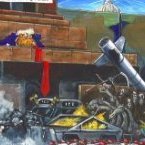Charter Debate Heralds Period Of Renewed Turbulence
-
Recently Browsing 0 members
- No registered users viewing this page.
-
Topics
-
-
Popular Contributors
-
-
Latest posts...
-
359
Road Rage (Foreigner Style)
Absolute nonsense. You're allowed to use the horn to prevent any accident. Not just to alert others of your approach. Even if you saw a car on the other lane about to cause an accident it would be perfectly legal to use the horn to warn them they're about to cause an accident The horn is not just for warning of your approach. Again total ignorance of the laws of traffic. -
83
Americans seek escape for political reasons at record numbers
A fascist is often defined as someone with whom I fundamentally disagree on political matters. Therefore, if your views oppose mine, you might be labeled a fascist. Furthermore, if you persist in asserting your perspective, it suggests a deeper issue that may reveal underlying racist or misogynistic attitudes. It’s essential to recognize the weight of our beliefs and the impact they have on the discourse we engage in. -
83
Americans seek escape for political reasons at record numbers
haha. what is a lefty? MAGAs got themselves and enemy to blame and Fux News gave it to them. Geez, it's like grade school play yard name calling. Lefty lefty lefty go home. How can you tell a "lefty" Big Nose? They are smart and well educated? So ferkin Juvenile. Are these really adults?- 1
-

-
2
Accident Motorbike Rider Dozes Off, Passenger Falls from Bangkok Flyover
Well, you made it up! No one died. -
83
Americans seek escape for political reasons at record numbers
My California friends are united in undermining the ghestopo tactics of the Trump administration. Trump and his SS are attempting to entrench themselves in power by putting Federal Troops in Red States with justifications that are complete lies. MAGA/GOP are deconstructing education, questioning science, trying to influence the courts -- history repeating itself. Nazi regime did just that. Most MAGAs are too brainwashed and set in the Fox News generated hate to see the writing on the wall. The country is heading for some hard times. -
1,321
Why so many chinese cars MG cars ? do people only care to buy something cheap, whatever is the quality ?
Nothing wrong with them, they also come with a 10-year warranty.
-
-
Popular in The Pub




.thumb.jpg.b54783ad387f65d779e04f535fcfeee9.jpg)









Recommended Posts
Create an account or sign in to comment
You need to be a member in order to leave a comment
Create an account
Sign up for a new account in our community. It's easy!
Register a new accountSign in
Already have an account? Sign in here.
Sign In Now